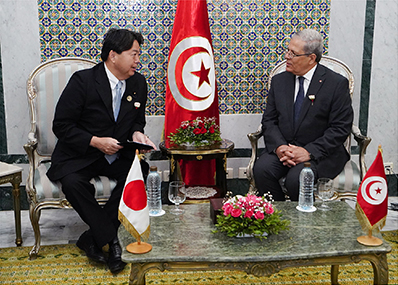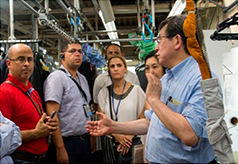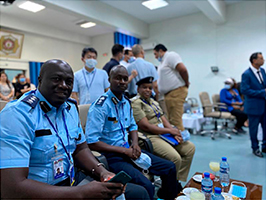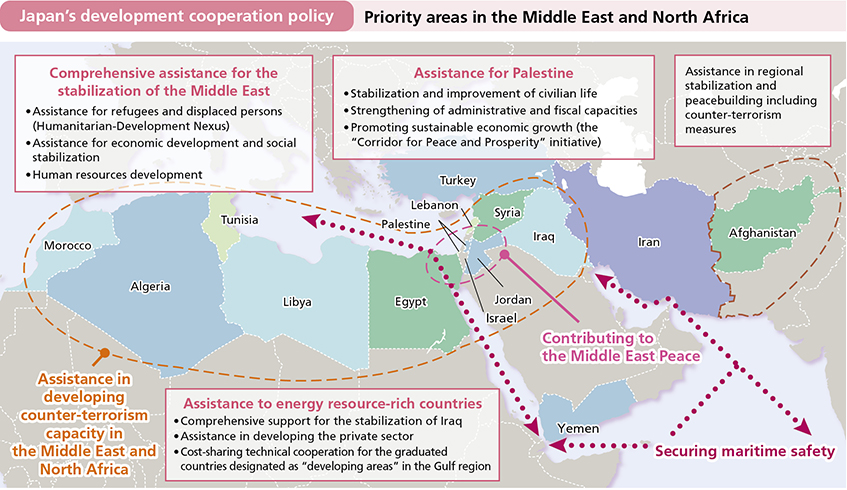7 Middle East and North Africa
Japan depends on the Middle East and North Africa region for approximately 90% of its crude oil imports, and the region, as a key point for global distribution, is critically important from the perspective of Japan’s economy and energy security. It is also a region with high potential and expectations for future growth due to its high rate of population increase, resulting in the expansion of the youth population.
At the same time, the region faces wide-ranging issues such as the Middle East Peace, political turmoil since “the Arab Spring,” and heightened tensions surrounding Iran. For example, conflict in Syria has continued and has brought about a large number of refugees and internally displaced persons, seriously affecting the stability of the neighboring countries and the entire region. In addition, after the Taliban’s takeover in Afghanistan in August 2021, humanitarian needs have increased in the country as well as in neighboring countries. Furthermore, the risk of proliferation of violent extremism such as the “Islamic State of Iraq and the Levant (ISIL)” still remains in various areas.
As a responsible member of the international community, Japan has made significant contributions to the peace and stability of the Middle East region through ODA and other means. Japan will continue to make active diplomatic efforts toward easing tension and stabilizing the situation in the region by taking advantage of the favorable relationships it has built with Middle Eastern countries
● Japan’s Efforts

Foreign Minister Hayashi holding a meeting with Mr. Jerandi, Minister of Foreign Affairs, Migration and Tunisians Abroad of Tunisia (August 2022)
Peace and stability in this region are extremely important for the stability and prosperity of the international community as a whole, including Japan. Thus, there is a need to provide support through such means as economic assistance and human resources development to achieve sustainable peace and stability in the region.
■ Support for Syria, Iraq, Lebanon, and the Neighboring Countries
With regard to the Syria issue, which is a pressing concern for the international community, Japan announced the provision of assistance at the sixth Conference on “Supporting the Future of Syria and the Region” (Brussels VI Conference) held in May 2022, and swiftly carried out the assistance totaling approximately 90 million US dollars. This assistance includes humanitarian aid and support for social stabilization for Syria and its surrounding countries (see also “Stories from the Field 2”).
As for Iraq, Japan provides assistance in the oil and gas sector, which are the foundation of Iraq’s economy, as well as in the electricity, water, and sewage sector, which constitute basic life services, through yen loans and other means, and also supports human resources development through technical cooperation. In addition, Japan engages in assistance to strengthen governance in Iraq with the aim of developing Iraq independently as a stable democratic state (see also Part II, 2-1 “(3) Assistance for Democratization”).
Since the outbreak of the Syrian crisis in 2011, Japan’s assistance to Syria, Iraq, and the neighboring countries has reached approximately 3.3 billion US dollars. In these ways, Japan provides timely and effective assistance to the region in response to the ever-changing humanitarian landscape (see also Part II, 2-2 (1) Support for Peacebuilding and Refugees/Displaced Persons).
Japan also provides support for human resources development and self-reliance of refugees. Japan accepted 125 Syrian students from FY2017 to 2022 to foster human resources who will contribute to Syria’s recovery in the future.
■ Assistance to Yemen
Yemen faces the “world’s worst humanitarian crisis” with approximately 80% of its population in need of some form of humanitarian aid due to the prolonged conflict. In this context, Japan has provided a total of over approximately 400 million US dollars in humanitarian aid to the country as a major donor country, through international organizations over eight years from 2015 to 2022. In 2022, in addition to the humanitarian aid through international organizations, Japan continued to provide education and training in Japan by accepting Yemeni students through Japanese Government Scholarship and conducting training for Yemeni experts through JICA, in order to foster human resources to back up Yemen’s self-reliant stabilization. Additionally, Japan provides support for strengthening the functions of the Port of Aden in Yemen to develop an environment that allows people to conduct economic activities (see “ODA Topics” for Japan’s assistance in the Port of Aden).
■ Assistance to Afghanistan
As humanitarian needs in Afghanistan and neighboring countries have increased since the Taliban seized power in August 2021, Japan has actively participated in international meetings, stated its policy for humanitarian aid, and emphasized the importance of ensuring the safety of aid workers and humanitarian access. At the High-Level Pledging Event on Supporting the Humanitarian Response in Afghanistan held in March 2022, co-hosted by the UN, the United Kingdom, Germany, and Qatar (which Foreign Minister Hayashi attended by delivering a pre-recorded video message), regarding the Taliban’s decision to postpone the re-opening of secondary schools for Afghan girls, the attendees called for the Taliban to urgently reverse this decision. They also emphasized that every Afghan citizen, regardless of gender, should be given an equal right to education at all levels. However, even after these statements were issued, there have been reports that the Taliban is further increasing restrictions on the rights of women and girls. In cooperation with the international community, Japan continues to urge the Taliban to improve the situation.
Since August 2021, Japan has decided on and implemented assistance totaling over 330 million US dollars through international organizations and NGOs in areas such as shelter, health, water and sanitation, food, agriculture, and education. The assistance includes emergency assistance provided in response to the damage caused by the earthquake that hit eastern Afghanistan in June 2022.
Since 2001, Japan has provided a wide range of development assistance to Afghanistan for the country’s sustainable and self-reliant development, hosting two ministerial-level support meetings (2002 and 2012) and supporting various sectors such as humanitarian needs, health, education, agriculture and rural development, and women’s empowerment. With regard to future assistance to Afghanistan, Japan will promptly implement the aforementioned humanitarian aid. Japan will also engage with the Taliban and respond appropriately after carefully assessing the aid needs for the people of Afghanistan, in close cooperation with the international community.
Tunisia
Triangular Cooperation for Africa with Tunisia as a Gateway
(1) Project on Quality/Productivity Improvement
(1) Technical Cooperation (Phase 1: September 2009 – March 2013, Phase 2: January 2016 – December 2021)
(2) Human Security as a Factor in Socio-Economic Development
(2) Contributions and Subscriptions to International Organizations (March 2021 – September 2022)
In Tunisia, where the Eighth Tokyo International Conference on African Development (TICAD 8) Note 1 was held, triangular cooperation for African countries is promoted by taking advantage of abundant human resources in various specialized fields.
Through JICA’s technical cooperation, Tunisia has been working on KAIZEN Note 2 in the industrial sector since 2006. So far, nearly 100 companies have implemented the KAIZEN methods such as organizing and revising flow lines to improve work efficiency, which has led to improved productivity. With this knowledge, Tunisia conducted KAIZEN training for Libya in December 2021. Approximately 30 people, including representatives of the Libyan Ministry of Economy and entrepreneurs, participated in this training, which served as a foothold for the introduction of KAIZEN in Libya. The Ministry of Industry, Mines and Energy of Tunisia aims to establish a Productivity and Quality Improvement Center (KAIZEN Center) to accept training participants from both inside and outside the country, in order to promote KAIZEN in Africa with Tunisia as a hub.
Japan’s community police activities are also expanding from Tunisia to other African countries. In Tunisia and through the United Nations Development Programme (UNDP), Japan makes efforts to establish “accessible police,” similar to Japanese police boxes, small police stations that serve local neighborhoods, to improve citizen’s accessibility to police stations. In July 2022, an African conference on “accessible police” was held in Tunis, with a total of 320 participants from 17 African countries and 11 international organizations.
In addition, third country training is conducted in Tunisia to share the knowledge of Japan and Tunisia with African countries, Note 3 in fields such as health and medical care.
The Government of Tunisia puts a lot of effort into education and has abundant professional human resources such as engineers and doctors. In addition to Arabic, many of these professionals are fluent in French and English. Making good use of this wealth of human resources, Japan’s technology and knowledge are expected to be transferred to African countries with Tunisia as a gateway.

In training in Japan, Tunisian trainees visiting a cleaning company that actually employs the KAIZEN methods (Photo: JICA)

Security agencies officials from Sub-Saharan Africa attending the African conference on “accessible police”
Note 1: See “ODA Topics.”
Note 2: See Note 32.
Note 3: In the technical cooperation projects, “Medical Equipment Management for African Countries” and “Waste Management and Urban Sanitation in African Cities,” third country training on proper use of medical equipment and on hygiene were conducted respectively.
■ Middle East Peace (Assistance to Palestine)
Japan has positioned its assistance to Palestine as one of the important pillars of its measures to contribute to the Middle East Peace, and has provided more than 2.2 billion US dollars in assistance since the 1993 Oslo Accords. Specifically, Japan provides various types of humanitarian assistance through international organizations and NGOs to improve the severe living conditions of the socially vulnerable people in the West Bank including East Jerusalem and people affected by conflicts in the Gaza Strip, Palestine. In April 2022, in response to the significantly worsened humanitarian situation in the Gaza Strip, due to the spread of COVID-19 and damages caused by the flood disaster, Japan provided Emergency Grant Aid of 3.35 million US dollars through the United Nations Relief and Works Agency for Palestine Refugees in the Near East (UNRWA). Moreover, from July to September 2022, Japan also provided assistance in the amount of 8 million US dollars through UNRWA and WFP for improving food security in Palestine and contributing to solving Palestine’s development challenges, among other purposes.
Japan is also engaged in a wide range of efforts, including to stabilize and improve the daily lives of Palestinians, strengthen the financial foundation, and enhance the quality of administration, aimed at preparing for the Palestinian nation-building in the future and for a self-sustained Palestinian economy. For example, Japan provides financial assistance to the tenant companies of the Jericho Agro-Industrial Park (JAIP), the flagship project of the “Corridor for Peace and Prosperity” initiative. Furthermore, in March 2022, Japan held an online meeting to connect 31 Palestinian companies, 7 Japanese companies, and 56 Vietnamese companies under the framework of the Conference on Cooperation among East Asian Countries for Palestinian Development (CEAPAD) Note 22 in order to promote business-to-business transactions.
■ Assistance to the North Africa Region
In Morocco, the “New Development Model,” which is positioned as the country’s long-term national development strategy, was formulated and published in May 2021. Regarding a strategy for the education sector, the Model identifies improving the quality of basic education as an urgent need. In response to this, in July 2022, Japan helped the country carry out educational reforms by providing financial support to the Government of Morocco, signing the Exchange of Notes (E/N) regarding the provision of a yen loan of up to 22 billion yen for the purpose of improving children’s learning environments (see “Stories from the Field 3” for Japan’s efforts in Egypt).
In Tunisia, triangular cooperation for African countries is promoted by taking advantage of the abundant experience and human resources of the country. The cooperation includes the promotion of a Japanese-style approach for improving quality and productivity called KAIZEN, introduction of “accessible police,” promoted by Japan, and third-party training in the medical care field (see “Project Introduction Column” for details).
Moreover, in August 2022, Foreign Minister Hayashi visited Tunisia as the Special Envoy of Prime Minister Kishida to attend the Eighth Tokyo International Conference on African Development (TICAD 8) (see “ODA Topics” for TICAD 8). During the visit, Foreign Minister Hayashi paid a courtesy call on President Saied, had a meeting with Mr. Jerandi, Minister of Foreign Affairs, Migration and Tunisians Abroad of Tunisia, and signed the bilateral technical cooperation agreement and the Memorandum of Cooperation on the Joint Credit Mechanism (JCM) between the two countries.
■ Support in Response to COVID-19
In 2022, Japan provided various assistance in response to COVID-19. Japan provided approximately 700,000 additional doses of vaccines manufactured in Japan to Iran through the COVAX Facility, Note 23 bringing the total number of vaccine doses provided by Japan to the Middle East and North Africa region to 5.16 million. In February, in cooperation with UNICEF, Japan provided equipment such as refrigerated vehicles for vaccines and training for local medical teams to Egypt, which faces the urgent challenge of developing a cold chain. In October, Japan decided to support Afghanistan for its sustainable COVID-19 vaccination by providing the necessary equipment to improve its cold chains systems. In Tunisia, Japan supports the development of a digital information management system for immunization status data to deal with threats to public health, through UNICEF, toward the upcoming revitalization of the economy and society in the post-COVID-19 era.

- Note 22: A regional cooperation framework launched by Japan in February 2013 to support Palestinian nation-building by mobilizing the resources and economic development expertise of East Asian countries toward realizing peace through a “two-state solution.”
- Note 23: See the glossary.
